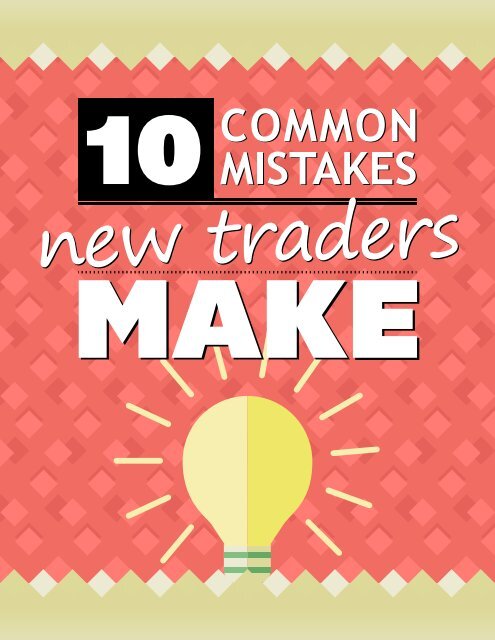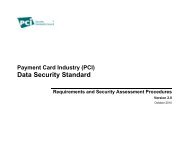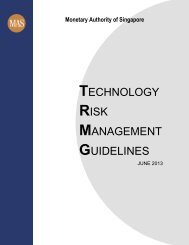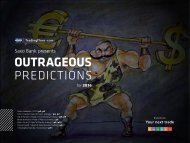10CommonMistakes
Learn about what traders will make when they trade , even the experience one.
Learn about what traders will make when they trade , even the experience one.
Create successful ePaper yourself
Turn your PDF publications into a flip-book with our unique Google optimized e-Paper software.
10<br />
new traders
10 COMMON MISTAKES<br />
NEW TRADERS MAKE<br />
Trading is a skill and with learning any skill there are pitfalls and missteps along the way. Understanding<br />
that mistakes are part of the process and learning to reduce them could help you develop a more<br />
disciplined, consistent approach to trading.<br />
Here are 10 of the most common mistakes that new traders make.<br />
1. EMOTIONAL TRADING<br />
Nobody can properly prepare a new trader for<br />
the emotional roller coaster and even the most<br />
experienced traders grapple with this after<br />
years in the business.<br />
Why is it so difficult to control your<br />
emotions? It may lie in our genetic<br />
make-up. Matt Golden, market analyst<br />
for TraderPlanet, discussed the science<br />
of trading and emotions at the VantagePoint<br />
Power User Seminar in Tampa in February.<br />
“When you feel emotions while trading, there is<br />
a physical, chemical reaction that is happening<br />
inside of you. These chemical levels are different<br />
for everyone. This is why trading is different for<br />
everyone, “Golden said.<br />
Golden points out that the emotions you feel<br />
are an involuntary response to those chemicals.<br />
This is part of human evolution, so it must be<br />
understood, and then controlled.<br />
“You have evolved to avoid pain and<br />
discomfort and developed a flight<br />
instinct. This is why most traders<br />
embrace flight. Flight from the market<br />
(at the worst time), flight from systems<br />
(because of the discomfort of drawdown), flight<br />
from success. This is all normal,” according to<br />
Golden.<br />
However, learning to take the emotion out of<br />
your trading is integral for long term success.<br />
1<br />
10 Common Mistakes New Traders Make
2. POOR PREPARATION AND PLANNING<br />
In trading, Winston Churchill’s famous quote,<br />
“Fail to plan, plan to fail” rings especially true.<br />
When you enter the market arena, you<br />
had better be prepared. However, few<br />
traders perform the necessary due<br />
diligence before moving headlong<br />
into the markets.<br />
You can’t just walk into the market with a<br />
handful of money and expect to take money<br />
away from the professionals. If that’s the case,<br />
you’re gambling, not trading. Many who trade<br />
successfully rely on a trading plan. Just like<br />
how a business plan outlines the establishment<br />
and development of a proposed business in<br />
detail, a trading plan outlines, in detail, a<br />
structure for trading.<br />
Trading plans are fluid in the sense<br />
that they are being tested constantly<br />
and amended to improve overall performance<br />
and profitability, but strict observance of the<br />
rules of the trading plan is often the hallmark of<br />
a successful trader.<br />
3. FAILING TO PUT A TRADING PLAN IN WRITING<br />
By writing down your trades in a journal, you<br />
can learn from your mistakes. But all too often<br />
newer traders fail to write things down and<br />
therefore fail to see the patterns and habits they<br />
may be forming.<br />
When you write down your rules everything<br />
changes. Instead of hoping that the<br />
market is going to do what you want, or<br />
you wondering if you should just hold<br />
on a bit longer, you go and look at your<br />
rules and they will tell you what to do.<br />
Once you write down your trading plan’s rules,<br />
you have a base to work with, which will allow<br />
you to grow and expand your plan to<br />
capture any market insights you<br />
learn while implementing it.<br />
This changes the dynamic of<br />
mistakes. Mistakes are now not<br />
about whether you win or lose on a trade.<br />
Rather, they are about whether you follow<br />
the rules of your plan. It establishes discipline<br />
in your trading, which is critical to your success.<br />
2<br />
10 Common Mistakes New Traders Make
4. A LACK OF OBJECTIVITY<br />
Most traders don’t want to acknowledge that a<br />
trade could turn against them. They enter the<br />
market assuming they’ll be successful, refusing<br />
to look in the rearview mirror. It’s also<br />
common for emerging traders to use<br />
a calculator to predict how much<br />
they’ll make and how they’ll spend the<br />
unrealized profits!<br />
Entering the market with a neutral<br />
attitude is a good approach. You need to<br />
believe anything can happen in the market at<br />
any time. This is what being objective is all<br />
about. A profitable trader needs to be thinking<br />
constantly that the market can do whatever it<br />
wants whenever it wants at any time. Many new<br />
traders get into trouble by thinking the market<br />
can’t or won’t do certain things.<br />
To be objective, you cannot put your<br />
demands and expectations on the<br />
market. This doesn’t mean that you<br />
can’t have an opinion about the market.<br />
It only means that your opinion can just<br />
as easily be wrong as it is right. And you<br />
need to be completely ready and comfortable<br />
for it to be wrong. You need to release yourself<br />
from having to be right. The more objective you<br />
are, the less you will distort the information you<br />
receive.<br />
5. INABILITY TO ACCEPT LOSSES<br />
New traders often become overly discouraged<br />
with losing trades. You need to remember<br />
that losses are part of the game of<br />
trading. Every trader will have some<br />
losses. In fact, many successful<br />
traders have many more losing<br />
trades than winning trades. But<br />
they still make money because their<br />
winning trades are considerably<br />
larger than their losing ones. You must<br />
think of your losses as part of the expense of<br />
doing business as a trader.<br />
Just like any business, trading involves having<br />
such expenses as your technical analysis<br />
software like VantagePoint, you<br />
data feed, your commission to your<br />
broker, etc. Losses are just another<br />
expense. Always try to keep them<br />
to a minimum but realize you will<br />
have this expense in your trading.<br />
3<br />
10 Common Mistakes New Traders Make
Intermarket Analysis<br />
Software<br />
“ When I first considered trading, I was very<br />
concerned about how I would be able to fit<br />
trading into my already hectic schedule. I saw a<br />
huge value in Vantage Point because it was going<br />
to do so much of the work for me evaluating the<br />
markets using the neural networks. ” - Carey M.<br />
“ I've tried many systems and talked with more<br />
guru's then I care to admit and as you know, I've<br />
had the unfortunate experience of wiping out my<br />
account a number of times over the years. Today,<br />
with the help of VantagePoint I now feel I'm finally<br />
on the right track.” - Bill C.<br />
“ I have been using Vantage Point software for three years now and<br />
absolutely feel that this is the best software on the market. ” - Wayne P.<br />
GET YOUR FREE LIVE DEMO
6. NOT USING STOP LOSSES<br />
Newer traders will listen to other people who<br />
will incorrectly them not to use stops, because<br />
the market will find them and take them out, or<br />
other nonsense like that. Guess what?<br />
The way the market moves is very simple to<br />
understand. If there are more sell orders,<br />
the market will go down, and if there<br />
are more buy orders the market will<br />
go up, regardless of where there are<br />
stops no matter what asset class2 you<br />
trade.<br />
Some people don’t want to use stop<br />
orders when trading because they are caught<br />
up in thinking that the market will hit their stop<br />
orders and then immediately start moving in<br />
their direction after they’re stopped out. And<br />
you know what? This will happen sometimes.<br />
For people who attempt to use mental stops<br />
(where they’ll just get themselves out of the<br />
market instead of putting the stop order in the<br />
market), the problem comes when the market<br />
does go through their mental stop orders,<br />
then reverses and starts moving back in their<br />
direction. Usually, these people are at a loss<br />
as to what to do next. And the unfortunate<br />
thing is that it usually costs them a lot<br />
of money, as they do not act in their<br />
best interests. They let losing trades<br />
turn into huge losing trades.<br />
All sorts of trading gurus will proclaim<br />
that use of stop orders is the best chance for<br />
achieving long term success. Most traders<br />
don’t have enough discipline to get out of their<br />
losing positions without using stop orders.<br />
7. IMPROPER RISK MANAGEMENT<br />
New traders often make one or two mistakes<br />
when it comes to determining risk; they either<br />
define the reward first, which is a mistake<br />
born out of greed, or they put a stop loss<br />
on the setup that is much too close to<br />
the entry to give the trade a chance at<br />
working out.<br />
When learning to think in probabilities<br />
and to view the market in terms of risk to<br />
reward, it is necessary to calculate the risk on<br />
a trade setup first, then you can calculate the<br />
reward as a multiple of the amount you<br />
have at risk. By concentrating on the<br />
risk first, instead of the reward, you<br />
are making yourself more aware of<br />
the risk involved on each trade setup,<br />
instead of becoming fixated on how big<br />
of a reward you might make, as many<br />
traders do. This will also turn you into a “risk<br />
5<br />
10 Common Mistakes New Traders Make
manager”, rather than a “trader”, the best traders<br />
in the world know that consistent trading profits<br />
come as a result of managing risk effectively, so<br />
consider yourself a manager of risk from now<br />
on.<br />
Personal psychology influences our thinking and<br />
decisions about money. A trader should never<br />
risk money they can’t afford to lose. Certainly,<br />
no one wants to trade with the goal of losing<br />
money but one must be ready and prepared for<br />
such an outcome.<br />
8. TRADING FROM ONLY THE LONG SIDE<br />
If you fail to learn how to utilize short trading<br />
strategies, then you have cut yourself<br />
out of a number of profitable trades,<br />
experts say. Many people think that<br />
shorting is un-American or too risky.<br />
However, by not learning know how to go<br />
short, you’re putting up a roadblock to one of<br />
the potential trading avenues you have to earn<br />
profits, particularly during a declining market.<br />
The market is a two-way street, and the person<br />
who doesn’t short is missing a part of the game.<br />
One of the great things about the<br />
VantagePoint predictive trading<br />
software is that it finds trading<br />
opportunities for both the long and the<br />
short sides of every asset class. Newer<br />
traders needs a technical system that allows<br />
them to find two way trading opportunities.<br />
9. FAILING TO LOOK AT THE BIG PICTURE<br />
Many new traders don’t know how to incorporate<br />
a multi-market or ‘intermarket’ approach into<br />
their trading. They only look at a single stock<br />
or asset class and fail to account for<br />
the big macro picture. For new stock<br />
traders, this often means only looking<br />
at the equity in isolation and if they do<br />
consider other markets, it’s the equity<br />
indexes or other stocks in the same<br />
sector.<br />
But Louis Mendelsohn, the founder of<br />
VantagePoint, recognized as early as the 1980s<br />
that there are dynamic interconnections<br />
between related global markets.<br />
Still, new traders too often take the<br />
historically narrow, single market focus<br />
of analyzing each individual market<br />
by itself, instead of incorporating it<br />
into a broader, global, multi-market or<br />
‘intermarket’ analytic framework.<br />
6<br />
10 Common Mistakes New Traders Make
10. NOT HAVING A TECHNICAL EDGE<br />
Most trading experts suggest that if you want<br />
to trade successfully, you need an edge. What<br />
do you know that will give you some degree of<br />
conviction? Many new traders don’t<br />
know the answer to this question, so<br />
they really have no technical edge.<br />
But newer traders don’t want their<br />
technical tools to be too complex.<br />
VantagePoint Predictive Trading Software<br />
can give new traders that needed technical<br />
edge. While extremely sophisticated under the<br />
hood, from a user’s perspective VantagePoint<br />
is incredibly easy to use, regardless of<br />
whether you’re new to trading or<br />
a highly experienced trader. All of<br />
VantagePoint’s predictive forecasting<br />
capabilities are completely built into<br />
the software and ready for you to use.<br />
It takes just a few minutes of your time<br />
each evening to update the software<br />
and pin-point trend changes and trading<br />
opportunities before other traders even have a<br />
clue about what’s about to happen.<br />
Thanks for Reading!<br />
10<br />
new traders<br />
7<br />
10 Common Mistakes New Traders Make











